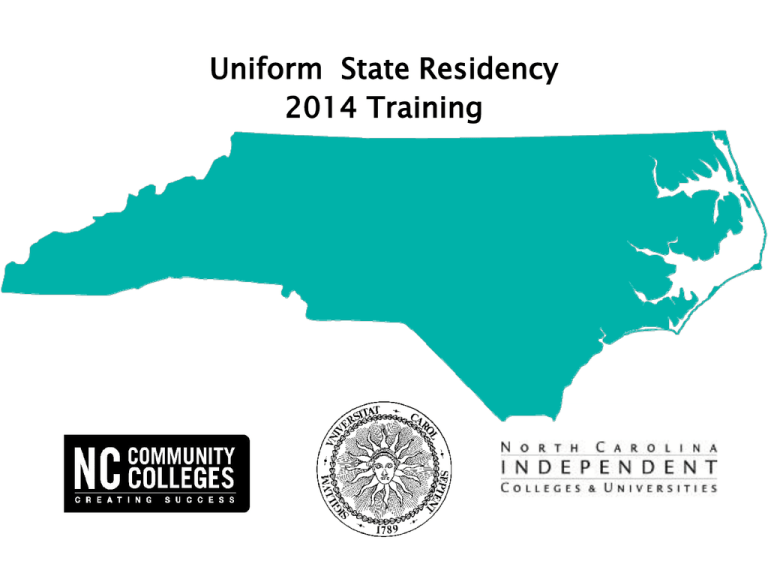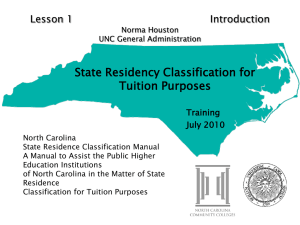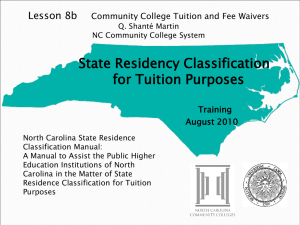
Uniform State Residency
2014 Training
As part of the UNC Efficiency Agenda, the Residency
Verification process was identified for review. An
August 2012 Collaborative Efficiency Review by OSBM,
in conjunction with UNC, analyzed the three areas of
residency classification (initial classification,
reclassification and the appeal process) and
recommended various options for improvement.
UNC General Administration directed UNC FIT to lead
a future state analysis for residency in March 2013,
engaging campus experts across the system.
Reduce inconsistent decision making and application
of the residency laws
Reduce duplicate student residency verifications
Provide a more efficient experience for students
Reduce burden and manual processes in place
on campuses
Identify a process that could serve undergraduate
and eventually graduate determinations
Identify a process that could serve all of higher
education in NC
In late July, Senate Bill 402 was passed by the North
Carolina General Assembly directing UNC to work in
conjunction with the North Carolina Community College
System (NCCCS), North Carolina State Education
Assistance Authority (NCSEAA), and the North Carolina
Independent Colleges and Universities (NCICU) on a
coordinated and centralized residency determination
process for higher education. The UNC vision project
continued the final stage by estimating costs for the
solutions identified earlier in the project noting that the
new law for a statewide vision may impact the
recommended solution for UNC.
(1) To meet the goals outlined in the UNC Study
(2) To Comply with the Legislative Directive
Mandating a Coordinated Residency Determination
Process across all NC Higher Education: Section
11.3(a) of Session Law 2013-360 and
(3) It’s the RIGHT thing to do
A Collaborative Higher Education Work Group composed
of representatives from the University of North Carolina
General Administration, NC Community Colleges System,
NC Independent Colleges and Universities and NC State
Education Assistance Authority, assisted by College
Foundation, Inc.
We are working in collaboration with The State Residence
Committee and with a team of residency experts across
UNC and Community Colleges
(1) Develop and implement a standard set of common
questions that all students must answer to determine
residency;
(2) Build and implement a structure/calculation algorithm
method to automate the residency determination, based
on answers to the common questions;
(3) Conduct statewide residency verification training;
(4) Develop and deploy a standardized Uniform Residency
reclassification and centralized appeal system;
(5) Integrate graduate admissions application data into
the standardized system
Phase I Deliverables due by June 30, 2014:
Development of Common Questions and Accompanying
Algorithm and State Residency Training;
Phase 2 Deliverables due by June 30, 2015:
Technical Development, Testing and Deployment of the common
questions and algorithm by June 30, 2015 (to be applicable to
students applying for admission for the Spring 2016 semester
and beyond) and B: Develop model for a standardized
reclassification and centralized appeal system
Phase 3 Deliverables (Due Date TBD):
Implement the standardized reclassification process; (B) Develop
plan to integrate graduate admissions application data into the
standardized system
Phase 4 Deliverables (Due Date TBD):
Integrate Graduate Admissions Application Data into the
Standardized System
(1)
(2)
(3)
(4)
Standard Questions are Developed
Algorithm Development is in progress
Training is being conducted today
Phase I Deliverables will be met!
(1) Standard Questions revolve around six areas of key residency
determination: (a) Citizenship; (b) Claim; (c) Domicile/Residence;
(d) Student Information; (e) Parent Information; and (f) Military
(2) Standard Algorithm will be applied to these questions to
determine initial residency
(3) There will be no human intervention
(4) CFNC Applications will have the residency questions and
algorithm embedded in them
(5) Other campus applications (which are NOT linked to CFNC) will
have to implement the standard questions and algorithm and will be
subject to audit for compliance OR they can choose to send students
to CFNC for residency determination (we will have focused follow-up
conversations with each of these campuses)
(6) Beginning with the Spring 2016 semester applicants (in place by
Aug 2015)
(1) Goal is to achieve greater uniformity NOW
(2) Take back what you gain from today’s conference
(3) Send questions in as you encounter issues that are difficult
(4) Review the FAQs that will be posted on the website
(5) Become familiar with the Standard Questions
(6) Think through your campus processes as to how the standardized
and automated processes will impact you
(7) Start Planning for change!
(8) Engage all of the necessary people on your campus
(9) Expect communications, protocol and guidance throughout this
project
To aid University and Community College
administrators in classifying a student’s
residency for tuition purposes.
To guide independent colleges and
universities in this state in determining the
number of North Carolina students on their
campuses for which they are eligible to
receive state funding.
To assist students and families in
understanding the law and policies related to
residence for tuition purposes.
1. Residence and Domicile are NOT the same –
it is the student’s domicile that determines
whether the student is eligible for in-state
tuition.
2. To be eligible for in-state tuition, state law
generally requires a student to have
established domicile in North Carolina for
12 consecutive months.
3. A student’s domicile is generally presumed
to be that of his or her parents.
The Initial Residency for Tuition Purposes determination
is completed a part of the application for admissions to
a college or university.
The residency reclassification process is in response to
the initial classification or to changes in circumstances.
Except for deadlines set out in General Statutes, UNC
Board policy, or SBCC Code, the deadline to submit the
reclassification application along with all supporting
documentation cannot be later than the 10th business
day of the term for which the student is seeking
residency reclassification.
Institutions may set their own deadlines so long as they
are not inconsistent with the these deadlines.
A person’s residential presence in a state
AND
That person’s particular intent related to that
presence
Residence ≠Domicile
Residence is where you live
A domicile is where you intend to return and
remain for an indefinite period of time
A person can have many
residences but only one domicile
In good faith with earnest intent.
A person must demonstrate that he or she
has established a bona fide, as opposed to a
temporary, domicile when seeking residency
classification.
Establishing domicile in North Carolina just to
become eligible for in-state tuition is not a
bona fide domicile.
The responsibility borne by the applicant to
convince the institution of higher education,
by a preponderance of the evidence, that the
student is a bona fide domiciliary for tuition
purposes.
This burden of proof is met by providing
tangible evidence to support relevant conduct
of legal residence and its duration as may be
required by officials of an institution of
higher education.
Legal ability to establish residence
unimpeded by other factors, such as age or
non-immigration status.
For purposes of legal residence for tuition
purposes, capacity includes the ability to
remain in North Carolina permanently
through one’s own financial resources.
A person’s true, fixed, and permanent home
and place of habitation of indefinite duration
(for an indefinite period of time); it is the
place where he or she intends and is able to
remain permanently and to which, whenever
the person is absent, he or she expects to
return. A person may have more than one
residence, but may have only one domicile.
For purposes of the Manual, “domicile” is
synonymous with “legal residence.”
Domicile may be established by:
◦ Birth
◦ Law
◦ Choice
Residence for tuition purposes is not
guaranteed – it must be established by the
student.
The burden of proof is on the student.
Evidence of domicile includes (but is not
limited to):
◦
◦
◦
◦
◦
Where the student lives
Voter registration and act of voting
Driver’s license and vehicle registration
Employment and payment of taxes
Ownership of real property
There is no “residence checklist” – each
application is considered on its own merit.
A person who is a legal resident of (is
domiciled in) North Carolina.
For purposes of the Manual, “domiciliary” is
synonymous with “legal resident.”
Documents and other proof verifying conduct
that is provided to officials of an institution
of higher education regarding legal residence
and its duration necessary to prove that an
applicant is entitled to in-state tuition.
The first classification of residency for tuition
purposes assigned to an applicant for
admission to a public institution of higher
education based on information received as a
part of the application for admission to that
institution.
Initial classification decisions by one institution
are not binding on another institution, nor are
initial classification decisions at one academic
level binding on another academic level within
that same institution.
Institutions, both public and private, that
offer post-secondary instruction in North
Carolina, including all UNC constituent
institutions and all Community Colleges.
.
A person who is court-appointed to act in the
place of an individual’s parents (usually
referred to as a “guardian of the person” or
“general guardian”).
A guardianship ends when the person reaches
age 18 or is otherwise emancipated.
“Custody” or “legal custodian” is not the same
as legal guardian.
A person under the age of
eighteen (18) years.
A person is no longer a minor on the date of
the person’s eighteenth birthday.
Generally, a minor is presumed to have the
same domicile as that of his or her parents or
legal guardians.
A false and fraudulent misstatement of fact.
If an applicant or someone acting on the
applicant’s behalf knowingly makes a
misrepresentation in connection with a state
residency application or appeal, that
misrepresentation could lead to a
misdemeanor charge.
The greater weight of the evidence; more
probable than not; proof which leads one to
find that the existence of the contested fact is
more probable than its nonexistence.
This standard is less stringent than “beyond a
reasonable doubt.”
It is not necessarily established by a greater
number of witnesses testifying to the fact,
but instead by evidence that has the most
convincing force.
A legal inference used to place the burden of
proof and of producing supporting evidence
on one party to a proceeding in order to
overcome that presumption.
Under North Carolina law, a minor’s domicile
is “presumed” to be that of his or her living
parents or legal guardian.
At first appearance or first view – before
investigation.
Under North Carolina law, the legal residence
of the applicant’s parents shall be prima facie
evidence of the applicant’s legal residence.
The process of an applicant's formal request
to review pertinent residentiary facts to
determine the correctness or an update of the
initial classification of residency for tuition
purposes by public institutions of higher
education.
A place of abode, whether permanent or
temporary.
“Permanent residence” means the legal
residence or domicile, whereas “temporary
residence” means one’s abode for an
undetermined or temporary duration.
A person may have many residences but only
one permanent, legal residence (domicile).
A person who has established legal residence
(domicile) in North Carolina and maintained that legal
residence for at least 12 months (365 days)
immediately prior to his or her classification as a
resident for tuition purposes.
The applicant must establish that his or her presence
in the State is, and during the required preceding 12
months was, for the purpose of maintaining a bona
fide domicile rather than maintaining a temporary
residence incident to enrollment in an institution of
higher education.
Supporting Documentation
Evidence of North Carolina domicile for tuition purposes includes
actions that would normally be characteristic and expected of any
permanent resident.
Domicile information – lease or rental agreement (if renting) or warranty
deed if purchasing.
Financial information – previous year’s tax return (federal & state)
Acts of residency – such as vehicle registration, voter registration,
driver’s license
Employment information
Citizenship or immigration status (if applicable)
Parent information ….the legal residence of parent(s) or legal guardian
shall be prima facie evidence of the individual's legal residence, which
may be reinforced or rebutted relative to the age and general
circumstances of the individual.
In-state benefits are provided only to
legal residents of North Carolina
The primary North Carolina statute
requiring domicile for in-state tuition
purposes is G.S. 116-143.1
It
must be shown that:
The person abandoned the first
domicile with the intention not to
return to it
And
The person established a new
domicile with the intention of making
the new residence a permanent home
In most cases it requires 12 months of
uninterrupted domicile in North Carolina
With minors the inquiry starts with the
parents or legal guardian
Once a student is 18, they have the legal
capacity to establish their own domicile
The classifier looks at the domicile of the
living parent(s) or legal guardian as prima
facie evidence. Student may rebut or reinforce
this legal presumption
Does the student have capacity to establish
residence? Are they 18, are they independent?
There are numerous factors to review and
consider as a whole. The classifier and appeal
boards are advised to look at actions more
than personal statements and emotional
appeals
Do not consider statements of intent to do
things in the future. Look at current actions.
What actions did the student
take to establish domicile
What actions did the student
take to establish domicile
When did the student complete
these actions
What actions did the student
take to establish domicile
When did the student complete
these actions
Why the student performed such
actions
The NC General Assembly has decided by law
that if the student has lived in North Carolina for
five consecutive years immediately prior to
enrolling or registering at an institution of higher
education, the domicile of the student’s parent(s)
is not presumed to be the student’s domicile,
even if the applicant is a minor.
Domicile is determined based on the information
supplied by the student with no statutory
presumption in favor of any particular piece of
evidence
Domicile of a Minor (under 18)
Minor with a Divorced or Separated Parents
After the Minor Turns 18
Special Considerations of the “Five-Year Rule”
for minors
Emancipated Minors
Wards of the State
Homeless
Based upon common law, it is “presumed” that a
minor is dependent upon their parent(s) for
domicile
If one parent is dead, then the domicile is of the
surviving parent
If the minor is an orphan - with no legal guardian
- domicile is the same as the person they live
with
Otherwise, their domicile is the one last
established by parent or legal guardian (court
appointed “guardian of the person” or “general
guardian”)
If the student has lived in North Carolina for five
consecutive years immediately prior to enrolling
or registering at an institution of higher
education with an adult relative, other than a
parent, and that adult relative is domiciled in
North Carolina and has served as a de facto
guardian for that minor child thenThe minor child is given the benefit of “resident
status for tuition purposes” (not legal residence
or domicile) for immediate enrollment the next
term in question
The child may have lived with more than one
adult relative over the five years
It does not require financial support, just
actual care
Once the child turns 18 they have legal
residency in North Carolina on their own and
can retain it as long as they do not abandon
the state
In North Carolina the rule includes:
Under the age of 18 but not under the age of 16
Legally considered a legal adult
Established by decree from district court judge in
the minor’s county of residence
The person is married
To make claim, the student must show legal
evidence of decree and all other information
related to a claim of domicile
Have student produce the court order, decree
of emancipation, or other evidence that is
legally valid in that state
Look at the application as you would for any
other independent student, regardless of
their age
Wards are orphans or other children who have
been placed in the custody of the state
Wards (age 17-23) who were a ward as of 18
in North Carolina, are eligible for a tuition
waiver at both university and community
colleges if
◦ They are a resident of the state
◦ Eligible for services under Chaffee Education and
Training Vouchers Program
The McKinney-Vento Homeless Assistance Act of 1986 is a
federal law that provides money for homeless shelter programs.
"Homeless" children are also entitled to the protections of the
McKinney-Vento Act.
The McKinney-Vento Act defines homeless children as
"individuals who lack a fixed, regular, and adequate nighttime
residence." The act provides examples of children who would fall
under this definition:
Children sharing housing due to economic hardship or loss of
housing;
Children living in "motels, hotels, trailer parks, or camp grounds
due to lack of alternative accommodations"
Children living in "emergency or transitional shelters"
Children "awaiting foster care placement"
Children whose primary nighttime residence is not ordinarily
used as a regular sleeping accommodation (e.g. park benches,
etc)
Children living in "cars, parks, public spaces, abandoned
buildings, substandard housing, bus or train stations…"
Domicile is with the parent who claims the
child as a dependent for tax purposes (parent
must also be a legal resident of North
Carolina to be classified as in-state)
Length of domicile in the state = the length
of time the in-state parent claimed them on
their taxes. This can be less than 12 months
as long a parent already has the necessary 12
months legal residency
To keep in-state status, the student must
perform as many residential acts as possible for
their circumstances to retain in-state residency
AND
The student must enroll at a North Carolina
institution of higher education not later than
the fall term after completion of education
requirement for admission (high school
graduation)
Tuition Waiver
Survivors of Deceased Law Enforcement/ Emergency Workers.
available to the surviving spouse and children of a law enforcement
officer (including sheriffs), firefighter, volunteer firefighter or rescue squad
worker who was killed as a direct result of a traumatic injury sustained in
the line of duty (including both active service and training for active duty).
Families of Disabled Law Enforcement/Emergency Workers.
available to the spouses and children of law enforcement officers
(including sheriffs), firefighters, volunteer firefighters, or rescue
squad workers who are permanently and totally disabled as a
direct result of a traumatic injury sustained in the line of duty
(including both active service and training for active service).
If a person has been properly classified as a resident for tuition
purposes and enjoyed that status while enrolled at an institution
of higher education in this state, a change in that person’s state of
residence does not result in an immediate, automatic loss of
entitlement to the in-state tuition rate. Students in this situation
are allowed a “grace period” during which the in-state rate will
still be applicable even though the student is no longer a legal
resident of North Carolina. The grace period can apply under
certain circumstances both to currently enrolled students as well
as to students who are no longer enrolled or who have graduated.
Currently Enrolled Students
First, the student must have been properly classified as a resident for
tuition purposes and
At the time of change of legal residence to a state other than North
Carolina, the individual must have been enrolled in an institution of
higher education in North Carolina.
A person whose change in legal residence occurred during a period
while not enrolled is not entitled to the benefit of the grace period.
The grace period extends for 12 months from the date of the
change in legal residence, plus any portion of a semester or
academic term remaining at the time the change in legal residence
occurred.
Students Who Are No Longer Enrolled
The student must have been properly classified as a resident for tuition
purposes at the time the student ceased to be enrolled at or graduated
from an institution of higher education in this state, and
Students Who Are No Longer Enrolled
The student must have been properly classified as a resident for tuition
purposes at the time the student ceased to be enrolled at or graduated
from an institution of higher education in this state, and
Subsequently abandons his or her domicile in North Carolina and then
reestablishes domicile in this state within 12 months of
abandonment, the student may reenroll at an institution of higher
education in this state as a resident for tuition purposes without
having to satisfy the 12-month durational requirement so long as the
student continuously maintains his or her reestablished domicile in
North Carolina at least through beginning of the academic term for
which in-state tuition status is sought.
It is important to note that a student may benefit from this particular
grace period only once during his or her life.
Burden of Proof
It is the student’s responsibility to provide the documentation
necessary to support his or her claims for in-state residency for tuition
purposes by the applicable deadlines.
Proof must include documentation supporting the date of departure
from North Carolina and the date of return to North Carolina.
Erroneous Classifications and
Erroneous Notices
The correctness of a residence classification may be tested
through the reclassification or the appeal process. Erroneous
classifications are different from undisputed classifications that
are communicated erroneously to the classified student or within
the classifying institution; these communications are called
“erroneous notices concerning classification.” Erroneous notices
are, by definition, written communications.
If a student who has been classified as a nonresident for tuition
purposes receives from an institutional officer an erroneous notice
informing that the student will be billed as a resident for tuition
purposes, the student will not be responsible for paying the out-ofstate tuition differential for any enrolled term commencing before
the classifying institution gives to the student actual notice in
writing, through certified mail, of the erroneous nature of the prior
notice.
Fraudulent Residence Applications
A residency application for in-state tuition status is fraudulent if
the residency classification is based on falsified information
concerning legal residence and/or a student knowingly withholds
correct residential information.
If a student willfully misrepresents his or her eligibility for a
tuition waiver under Chapter 115B of the North Carolina General
Statutes, the student, along with anyone who knowingly assists
the student, in the misrepresentation may be subject to criminal
misdemeanor punishment.
FOREIGN NATIONALS
Non-U.S. Citizens
Persons who are not U.S. citizens but who have certain visa and immigration
statuses that grant them the legal ability to establish and maintain a bona fide
domicile in this country are subject to the same considerations as U.S. citizens
in determining residence status for tuition purposes.
First, determine the immigration status of the applicant based on the visa
category through evidence of either of the following:
Visa Classifications Eligible for Residence for Tuition Purposes
►A valid A-1, A-2, E-1, E-2, E-3, G-1, G-2, G-3, G-4, H-1B, H-1C, H-4, I, K-1,
K-2, K-3, K-4, L-1 A , L-1B,L-2, N, O-1, O-3, P-1, P-2, P-3, P-4, R-1, R-2, T-1,
T-2, T-3, T-4, T-5, U-1, U-2, U-3, U-4, U-5, V-1, V-2, V-3, NATO-1, NATO-2,
NATO-3, NATO-4, NATO-5, or NATO-6 visa status
Visa Classifications Eligible for Residence for Tuition Purposes con’t
►A pending Application to Adjust Status (Form I-485 receipt notice) and
an approved Immigrant Petition (Forms I-130, I-360, or I-140).
► One of the following:
(1) A Permanent Resident Card I-551; or
(2) A USCIS-issued notice of approval of Application to Adjust Status (I-485);
or
(3) A current Conditional Permanent Resident Card. (issued for 2 year period
only.)
A current Conditional Permanent Resident should be initially
classified non resident followed by receipt of the confirming
documentation - then for only the period of time for which the
Conditional Permanent Resident card was issued.
Refugee or asylum status with approval documentation.
Temporary Protected Status (TPS) is an approved immigration status
eligible for consideration as a resident for tuition purposes.
Visa Classifications NOT Eligible for Residence for Tuition Purposes
Non-U.S. citizens present in the United States under certain visa statuses
such as tourists, visitors on business, and temporary foreign/international
students do not have the legal capacity to establish a bona fide domicile
in this country (and thus, not in North Carolina).
B, C, D, F, J, M, Q, S, and TN visas (and dependent visas
for spouses and children such as a TD visa) cannot
establish domicile with these documents
Employment Authorization Document (EAD) in and of itself, does not give the
EAD holder the legal capacity to establish residency for tuition purposes in
this state.
Deferred Action for Childhood Arrivals
(DACA)
Were born after June 15, 1981;
Arrived in the United States before the age of 16;
Have continuously resided in the United States since June 15, 2007, up to the
present time;
Were present in the United States on June 15, 2012;
Entered without inspection before June 15, 2012 or your lawful immigration status
expired as of June 15, 2012;
Are currently in school, graduated or received a certificate of completion from high
school, obtained a general educational development certificate (GED), or that you
are an honorably discharged veteran of the Coast Guard or U.S. Armed Forces; and
Are at least 15 years of age at the time of filing, if never been in removal
proceedings or if their case was terminated before your request.
Deferred Action for Childhood Arrivals
(DACA)
Receive an Employment Authorization document (EDA card).
DACA students are not eligible for the resident tuition status.
The legal union of a man and a woman in
accordance with the laws of the State of
North Carolina.
North Carolina law defines marriage as being
between a man and a woman. North Carolina
does not recognize marriages between
persons of the same gender performed in
another state even if those marriages are
legally valid under the laws of that state.
Spousal Benefit
The qualifying event (the wedding) must have occurred prior to the first day of
the term for which the in-state tuition rate is requested.
Qualification for this benefit is determined by information provided by the
applicant including the North Carolina resident spouse’s residency information
and legally valid marriage documentation.
Applicant may use the time in North Carolina for the North Carolina spouse to
meet the 12-month requirement for in state tuition.
North Carolina law defines marriage as being between a man and a woman.
G.S. 51-1. Requisites of marriage; A valid and sufficient marriage is created by the consent of a
male and female person who may lawfully marry, presently to take each other as husband and wife,
freely, seriously and plainly expressed by each in the presence of the other, either:
(1)
a. In the presence of an ordained minister of any religious denomination, a minister
authorized by a church, or a magistrate; and
b. With the consequent declaration by the minister or magistrate that the persons are
husband and wife; or
(2)
In accordance with any mode of solemnization recognized by any religious denomination, or
federally or State recognized Indian Nation or Tribe .
Same Sex Marriages
G.S. 51-1.2. Marriages between persons of the same gender not valid.
Marriages, whether created by common law, contracted, or performed outside
of North Carolina, between individuals of the same gender are not valid in
North Carolina. (1995 (Reg. Sess., 1996), c. 588, s. 1.)
Non-Military Federal Personnel, Volunteers, and Missionaries
Federal employees may establish domicile for themselves and their
dependents by the usual requirements of residential acts plus intent.
Individuals employed by federal agencies such as the United States Foreign
Service, State Department, and volunteers with government agencies such
as the Peace Corps must establish and maintain domicile for tuition purposes
under the general rules of domicile.
Similarly, individuals who participate in programs such as Teach for America
or who are missionaries affiliated with religious organizations may establish
domicile in this state and maintain that domicile during their absence.
There is not, however, a specific statutory provision under North Carolina law
that grants special residence status for tuition purposes for federal personnel,
Volunteers, missionaries or Teach for America.
Dependent vs Independent
A person defined under federal law as a “qualifying
child” or “qualifying relative” for income tax
purposes.
To claim someone as a dependent, the
dependent must have legal status in this country,
Canada, or Mexico for some part of the year.
A spouse is never a dependent.
IRS regulations should be consulted!
To be a dependent for income tax purposes,
specific requirements for the following
factors must be satisfied:
◦
◦
◦
◦
◦
Relationship
Age
Residence
Level of financial support
Tax Filing Status
A student may still be financially dependent
on his or her parents even if the parents don’t
claim the student as a dependent for income
tax purposes.
Financial independence must be established
as part of the residence classification
process.
A person who is legally entitled to claim, and in
fact does claim, himself or herself on income tax
returns, is not claimed by another person as a
dependent on that person’s income tax return, and
possesses sufficient funds to live and pay tuition
and fees at the person’s current residence
classification without outside financial assistance.
Generally, students who are financially dependent
on parents who are not domiciled in North
Carolina will not be eligible for in-state tuition.
A student may still be financially dependent on
his or her parents even if the parents don’t claim
the student as a dependent for income tax
purposes.
Failure to claim a student as a dependent for
income tax purposes does not automatically
make the student “financially independent” from
his or her parents.
Factors relevant to determining whether a
student is “independent” include:
◦ Employment, income, & assets
◦ Level of financial support from parents
◦ Level of outside financial assistance from other
sources
◦ Status for financial aid purposes
There is no “independence checklist” – each
application must be considered on its own
merit.
A trust is a legal relationship in which one person (qualified trust
company or trustee) holds property for the benefit of another
(beneficiary).
Often established by one person for the benefit of himself or of
another. In these cases, it generally involves at least three people:
the grantor (the person who creates the trust, also known as the
settlor or donor), the trustee (who holds and manages the
property for the benefit of the grantor and others), and one or
more beneficiaries (who are entitled to the benefits).
It may be helpful to think of a trust as a contract between the
grantor and the trustee.
GRAT (Grantor Retained Annuity Trust)
Revocable
Irrevocable
Asset Protection
Charitable
Constructive
Special Needs Trust
Spendthrift Trust
Tax By Pass Trust
Totten Trust
GRAT (Grantor Retained Annuity Trust)
A grantor retained annuity trust (GRAT) is a useful strategy
to shift wealth from one generation to the next with little risk
and typically little or no gift tax.
A grantor creates a GRAT by transferring assets into an
irrevocable trust while retaining the right to receive an annual
payment known as an annuity.
Revocable Trust
Revocable Trusts are created during the lifetime of the
donor and can be altered, changed, modified or revoked
Irrevocable Trusts
An Irrevocable Trust is one which cannot be altered,
changed, modified or revoked after its creation. Once a
property is transferred to an Irrevocable Trust, no one,
including the donor, can take the property out of the
Trust.
Members of the Armed Forces
and their families
Members of the Armed Forces and Their Families
Active duty personnel in the armed services, and their spouses, dependent
children and dependent relatives may be eligible for in-state tuition. If they
qualify for admission, they may qualify for in-state tuition in two ways:
As a domiciliary of the State
OR
Under a special provision of North Carolina and federal law requiring
that non-resident active duty military personnel and their eligible
family members be charged in-state tuition.
Members of the Armed Forces and Their Families
A North Carolina domiciliary does not lose in-state status
simply by joining the armed services or by being assigned
outside North Carolina by the military.
As a domiciliary of the State the service member generally
enlists from North Carolina and maintains North Carolina as
their state of legal residence while in active status. The legal
state of residence can be verified with copies of the active
service member’s Leave and Earnings Statement (a.k.a. LES)
along with other usual supporting documentation.
Members of the Armed Forces and Their Families
A North Carolina domiciliary does not lose in-state status
simply by joining the armed services or by being assigned
outside North Carolina by the military
As a domiciliary of the State the service member generally
enlists from North Carolina and maintains North Carolina as
their state of legal residence while in active status. The legal
state of residence can be verified with copy of the active service
member’s Leave and Earnings Statement (a.k.a. LES) along with
other usual supporting documentation.
The domiciled active duty member who is assigned outside of
North Carolina has the burden of proving that North Carolina
residency has been maintained by providing documentation in
support of that claim.
Members of the Armed Forces and Their Families
Recent federal law allows the spouses of military personnel to
retain legal residency (domicile) in the spouse’s home state
for voting and tax purposes after relocating from that state to
accompany the military member. Being able to retain legal
residency for voting and tax purposes may make it easier for
the spouse to retain domicile status in his or her home state.
Under a Special Provision of North Carolina and Federal Law
or G.S. 116-143.3
The service member’s permanent duty station must be in North Carolina as
of the first day of the semester or term for which the in-state tuition
benefit is requested.
Eligibility is confirmed by a letter (on military letterhead) from the service
member’s commanding officer or personnel officer indicating the
following information:
Name of service member
Confirmation of active status
Permanent duty station location
Any pending discharge information
If a non-domiciled active duty member of the armed services or eligible
family member qualifies for the instate tuition rate and his or her
military status changes, the following rules apply:
Reassignment. If the active duty member is reassigned to a military
base or installation outside of North Carolina, the service member and
his or her spouse and dependent relatives will continue to be eligible
for the in-state tuition rate as long as the service member, spouse, or
dependent is continuously enrolled in the degree or other program in
which they were enrolled at the time of reassignment. The service
member’s dependent must continue to be a dependent to qualify for
the benefit.
Retirement. If the active duty member retires, the service member and
his or her spouse and dependent relatives will continue to be eligible
for the in-state tuition rate as long as they remain continuously
enrolled in the degree or other program in which they were enrolled
at the time of retirement. The service member’s dependent must
continue to be a dependent to qualify for the benefit.
Honorable Discharge. If the active duty member receives an Honorable
Discharge (no other type of discharge will qualify), the service member
is eligible for the in-state rate if he or she establishes legal residency in
North Carolina within thirty days of discharge and is continuously
enrolled in the degree or other program in which he or she was enrolled
at the time of Honorable Discharge. A dependent relative of an
honorably discharged service member must establish legal residency
within thirty days after the discharge, remain continuously enrolled in
the degree or other program in which the dependent was enrolled at
the time of discharge, and remain a dependent of the service member
who is honorably discharged to continue to be eligible for the in-state
rate.
North Carolina National Guard
Any member of the North Carolina National Guard, regardless of whether
the person is a legal resident of North Carolina, is eligible for in-state
tuition rate during the Guard member’s period of service whether in a
reserve or active status.
The in-state tuition benefit does not apply to the spouses or dependents
of non-resident Guard members unless the Guard member is serving in
North Carolina on active duty.
Military reservists (other than those of the North Carolina National
Guard) must be on active duty to qualify for the in-state tuition benefit.
Supporting documentation must include a copy of the member’s
enlistment documents showing the member’s name, home of record,
place of enlistment, date of enlistment and length of time of enlistment
commitment.
State Residence Appeals
Most Recent Details of the Policies and
Procedures of the State Residence
Committee (SRC) as it applies its:
◦ Composition
◦ Functions
◦ Grounds for Appeal
◦ Procedures and Deadlines
◦ Basis of Review
Equal Representation from the University
System and the Community College System
Office. Currently there are 7 from each
system.
Current term of appointment = 2 years
September to July
One Co-Chair from each system main office
Members recuse themselves during
deliberations, discussion, and voting on
records from their own institutions
Decide cases appealed to it from the
campuses
Evaluate campus procedures, current law and
substantive rules, and make appropriate
recommendations
Maintain a current State Residence
Classification Manual = a.k.a. “The Manual”
Advise and share general advice about
residency classifications for tuition purposes
including training opportunities for classifiers
There are four sole grounds for appeal:
◦ The decision was made in disregard of or mistake
with reference to the requirements of law or Manual
policy
◦ Manual provisions as currently stated do not
address the present issue and the decision violates
state or federal law
◦ Manual provisions as currently stated are at
disagreement with later developed case law relevant
to the decision
◦ The record does not support the conclusion
reached by the institution and is not reasonable
The SRC follows the policies and procedures
of both its operation as well as the policies
and procedures of the institution
Deadlines are strictly followed
Failure to follow timelines and procedures
may result in a dismissal of the case by the
SRC
The SRC ONLY reviews the case “on the
record” and no new information may be
attached, forwarded or included that was not
reviewed by the campus classifying bodies
Additional materials will not be reviewed by
the SRC, including new information contained
within the student’s appeal letter to the SRC.
The Policies and Procedures of the State
Residence Committee (updated Fall 2011)
provides clear steps for the procedures a
petitioner must follow in the filing of an
appeal with the SRC
As defined in the current policy, a total of 50
days plus processing time may pass before
the case arrives at the SRC
The case must be received at UNC at least 30
days prior to the next scheduled SRC meeting
Sustain
Overturn
Decline to review due to procedural error or
proper bases for review
Remand for further institutional inquiry or
further action. This case could return to SRC
at a later time for final appeal if campus
concludes terms of the remand and decision
remains out–of-state
Final decision is provided in writing
The SRC is the final administrative remedy
The SRC is exempt form the North Carolina
Administrative Procedure Act and is not
required to give reasons for its decisions
One of the duties of the SRC is to review,
advise and adopt forms used by the
institutions for the purpose of conducting
appeals
Make routine visits to the website:
http://www.northcarolina.edu/legal/residence/index.htm
For updates and changes in residency
classification law







